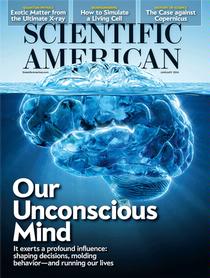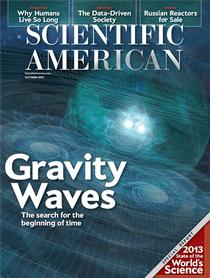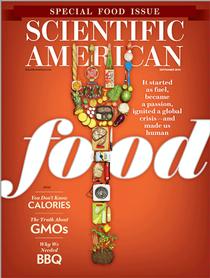January 1, 2014
Where do nonhuman mammals fit in our moral hierarchy?
The case for exploiting animals for food, clothing and entertainment often relies on our superior intelligence, language and self-awareness: the rights of the superior being trump those of the inferior. A poignant counterargument is Mark Devries’s Speciesism: The Movie, which I saw at the premiere in September 2013. The animal advocates who filled the Los Angeles theater cheered wildly for Princeton University ethicist Peter Singer. In the film, Singer and Devries argue that some animals have the mental upper hand over certain humans, such as infants, people in comas, and the severely mentally handicapped. The argument for our moral superiority thus breaks down, Devries told me: “The presumption that nonhuman animals’ interests are less important than human interests could be merely a prejudice— similar in kind to prejudices against groups of humans such as racism—termed speciesism.”
I guess I am a speciesist. I find few foods more pleasurable than a lean cut of meat. I relish the feel of leather. And I laughed out loud at the joke about the farmer who castrates his horses with two bricks: “Does it hurt?” “Not if you keep your thumbs out of the way.” I am also troubled by an analogy made by rights activists that animals are undergoing a “holocaust.” Historian Charles Patterson draws the analogy in his 2002 book Eternal Treblinka, and Devries makes visual reference to it by comparing the layout of factory-farm buildings to that of prisoner barracks at Auschwitz. The flaw in the analogy is in the motivation of the perpetrators. As someone who has written a book on the Holocaust (Denying History, University of California Press, revised edition, 2009), I see a vast moral gulf between farmers and Nazis. Even factory-farm corporate suits motivated by profits are still far down the moral ladder from Adolf Eichmann and Heinrich Himmler. There are no signs at factory farms reading “Arbeit Macht Frei.” (continue reading…)
December 1, 2013
The decline of religion and the rise of the “nones”
Since the early 20th century, with the rise of mass secular education and the diffusion of scientific knowledge through popular media, predictions of the deity’s demise have fallen short, and in some cases—such as in that of the U.S.—religiosity has actually increased. This ratio is changing. According to a 2013 survey of 14,000 people in 13 nations (Germany, France, Sweden, Spain, Switzerland, Turkey, Israel, Canada, Brazil, India, South Korea, the U.K. and the U.S.) that was conducted by the German Bertelsmann Foundation for its Religion Monitor, there is both widespread approval for the separation of church and state, as well as a decline in religiosity over time and across generations.
In response to the statements “Only politicians who believe in God are suitable for public office” and “Leading religious figures should exercise an influence on government decisions,” even in über-religious America only 25 percent agreed with the former and 28 percent with the latter. All other countries reported lower figures (with Spain at or near the bottom at 8 and 13 percent and Germany in the middle at 10 and 21 percent, respectively). Moreover, most of the countries in the survey showed a declining trend in religiosity, especially among the youth. In Spain, for example, 85 percent of respondents older than 45 reported being moderately to very religious, but only 58 percent of those younger than 29 said they were. In Europe in general, only 30 to 50 percent said that religion is important in their own lives. (continue reading…)
November 1, 2013
How weird beliefs can land you in jail
When I was in college, my friend and I attended a tax seminar in which we were told that paying taxes was unnecessary because the Sixteenth Amendment—empowering Congress to levy an income tax—was never legally ratified. After a long and detailed history of the IRS, we were advised not to file a tax return and given instructions on what to do and say when the feds come a-knockin’. The slick presentation seemed internally coherent and logically plausible in the room, but later, after some reflection, I figured it couldn’t possibly be true because no one would pay taxes if it were. In contrast, my friend went for it and got away tax-free for years, until the IRS caught up with him and he got his comeuppance.
I was thinking about this incident in August, when I appeared as an expert witness on the psychology of why people fall for such schemes in a Portland, Ore., court in the case of USA v. Miles J. Julison, a house flipper who neared financial ruin after the housing-market meltdown. That year he reported $583,151 in “other income” to the IRS on his tax return, claiming that the entire amount was withheld as income taxes. Submitting eight IRS 1099–OID (Original Issue Discount) forms, Julison requested a refund of $411,773. (According to the IRS, an “OID is a form of interest. It is the excess of a debt instrument’s stated redemption price at maturity over its issue price.”) The IRS sent him a check in that amount, which he spent on a home loan, personal debts, a car and a boat. Emboldened by his success, the next year he demanded a refund of more than $1.5 million. This time, however, instead of a refund check he got a trip to court and, after a guilty verdict, jail. (continue reading…)
October 1, 2013
Then ideology needs to give way
Ever since college I have been a libertarian—socially liberal and fiscally conservative. I believe in individual liberty and personal responsibility. I also believe in science as the greatest instrument ever devised for understanding the world. So what happens when these two principles are in conflict? My libertarian beliefs have not always served me well. Like most people who hold strong ideological convictions, I find that, too often, my beliefs trump the scientific facts. This is called motivated reasoning, in which our brain reasons our way to supporting what we want to be true. Knowing about the existence of motivated reasoning, however, can help us overcome it when it is at odds with evidence.
Take gun control. I always accepted the libertarian position of minimum regulation in the sale and use of firearms because I placed guns under the beneficial rubric of minimal restrictions on individuals. Then I read the science on guns and homicides, suicides and accidental shootings (summarized in my May column) and realized that the freedom for me to swing my arms ends at your nose. The libertarian belief in the rule of law and a potent police and military to protect our rights won’t work if the citizens of a nation are better armed but have no training and few restraints. Although the data to convince me that we need some gun-control measures were there all along, I had ignored them because they didn’t fit my creed. In several recent debates with economist John R. Lott, Jr., author of More Guns, Less Crime, I saw a reflection of my former self in the cherry picking and data mining of studies to suit ideological convictions. We all do it, and when the science is complicated, the confirmation bias (a type of motivated reasoning) that directs the mind to seek and find confirming facts and ignore disconfirming evidence kicks in. (continue reading…)
September 1, 2013
Why great scientists make great mistakes
“Alien abductors have asked him to probe them.” “Sasquatch has taken a photograph of him.” The “him” is the “Most Interesting Man in the World,” the faux character in the Dos Equis beer ad campaign, and these are my favorite skeptical lines from a litany of superfluities and braggadocios. (“In a past life, he was himself.”)
My candidate for the most interesting scientist in history I’d like to have a beer with is Alfred Russel Wallace, the 19th-century naturalist and co-discoverer (with Charles Darwin) of natural selection, whose death centennial we will marking this November. As I document in my 2002 biography of him— In Darwin’s Shadow (Oxford University Press)—Wallace was a grand synthesizer of biological data into a few core principles that revolutionized biogeography, zoology and evolutionary theory. He spent four years exploring the Amazon rain forest but lost most of his collections when his ship sank on his way home. His discovery of natural selection came during an eight-year expedition to the Malay Archipelago, where during a malaria-induced fever, it struck him that the best fit organisms are more likely to survive and reproduce.
Being open-minded enough to make great discoveries, however, can often lead scientists to make great blunders. Wallace, for example, was also a firm believer in phrenology, spiritualism and psychic phenomena, evidence for which he collected at séances over the objections of his more skeptical colleagues. Among them was Thomas Henry Huxley, who growled, “Better live a crossing-sweeper than die and be made to talk twaddle by a ‘medium’ hired at a guinea a séance.” (continue reading…)






